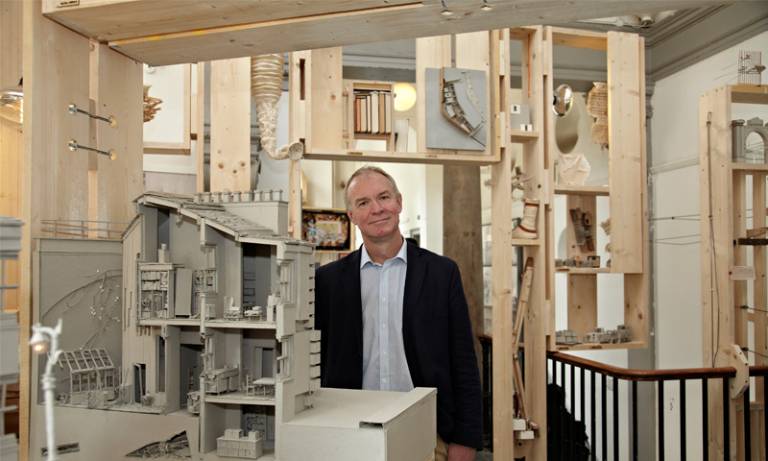The Bartlett is expanding – and that expansion is following a particular agenda. Words: Professor Alan Penn, Dean of The Bartlett

We want to be comprehensive, while ensuring that each of our constituent parts has the scale to be excellent in its own right. Achieving this requires new collaborations and it requires space. In 2016, we reopened 22 Gordon Street and started construction at Here East in Stratford – both spaces intended to help us reach critical mass.
We want to be the world’s number one faculty of the built environment. Up until now, there have been two areas that have been missing from a comprehensive portfolio of built environment activity. One of those is civil engineering and what Here East does is bring together parts of The Bartlett School of Architecture, The Bartlett School of Environment, Energy, and Resources (BSEER) and UCL’s Department of Civil, Environmental and Geomatic Engineering in the same space. From this partnership comes a new programme starting in 2017/18, a four-year undergraduate MEng in Engineering and Architectural Design.
The second area is real estate. 2017 will see us open the Real Estate Institute. We aren’t limiting ourselves to the notion of buildings as tradeable assets or as labels – ‘commercial’ or ‘retail’ – but to a wider understanding of the societal value of the built environment. We’ll be covering a side of property that has never been tackled comprehensively before: its intangible value.
These are difficult problems for economics: how do I put a value on heritage? What is the value of design? What is the value of urban place-making? The Real Estate Institute will be developing answers to all of these questions, while looking at their potential to shift development financing to new pathways conducive to a more socially meaningful environment. As the last year in politics has shown, if government fails to make people’s lives feel meaningful, they will respond at the ballot box.
The Real Estate Institute will build on the momentum started with the launch of the UCL Institute for Global Prosperity in 2015. Having previously dealt with the mechanics of the city, we are now starting to dig deeper into how the built environment shapes the social and economic fabric of society.
We can’t ignore the role that technology in our cities, from big data to artificial intelligence, can play in this. These are hugely exciting areas – but it is critical that we employ design thinking in their development if they are going to create social value, rather than become part of the problem. That’s why 2016 also saw the establishment of the Institute of Digital Innovation in the Built Environment (iDIBE), whose task will be to explore these new digital, physical and spatial realms. iDIBE builds on The Bartlett’s strength in design for robotics and advanced manufacture in the School of Architecture; data science, visualisation, and the Internet of Things at CASA; energy systems modelling at UCL Energy Institute; and spatial analysis and urban modelling in the Space Syntax Laboratory.
It is early days, but these moves reflect the strategic direction of The Bartlett: to challenge the way people think about economics and growth, and to try to create an understanding of the built environment, including its new technologies, as a central element of how society works. The way we build our buildings and the way we build our cities actively affects the form of society that we construct. We have learned that the traditional conception of the built environment as a passive outcome of social action is only part of the story – it also plays an active role.
What allows The Bartlett to make these forward-thinking moves? One part of the equation is that we’re in London and, in world-city terms, this is the place where all the interesting thinking is going on in these areas – from new financial technologies and business models, to new forms of manufacture and production, to new ways of conceiving of services. Another is because we’re part of UCL, a university that encourages people to think boundary-breaking thoughts and enables networks across interdisciplinary boundaries, which means we can look at a single problem from many different perspectives.
We’ve recognised that you can only create an excellent educational experience if you have a truly diverse cohort of people. Our view is that diversity in all its guises is essential – without it in every area of university life, one cannot hope to be truly excellent. This year, The Bartlett achieved the Athena Swan Bronze Award, demonstrating our commitment to furthering the careers of female staff at every level of the faculty. We are not restricting our efforts to gender equality – our action plans focus on the steps we can take to ensure that the way we work is equal and fair for everybody within the staff and student body.
Society in general is going through a major transition. We’re moving from an industrial to a post-industrial age, and the transition will not be easy, as there will be winners and losers. The EU Referendum vote was a wake-up call; raising questions about the value of experts and research and about how people feel they create value for, and identify with, society. This is a design problem, and one that The Bartlett, working at the boundary of the arts, social and physical sciences, can help to solve. This is our challenge.
 Close
Close

